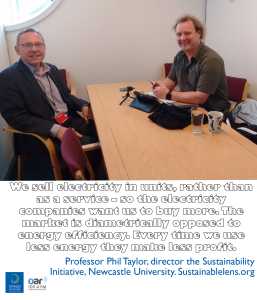We sell electricity in units, rather than as a service – so the electricity companies want us to buy more. So the market is diametrically opposed to energy efficiency. Every time we use less energy they make less profit.
Prof Phil Taylor is Director of the Sustainability Institute at Newcastle University. We talk about his increasingly transdisciplinary career and the changes required for a transition to a decarbonised energy system.
Talking points
I was always searching for application domains, reasons for doing it.
My career has become more and more interdisciplinary….really stimulating and challenging.
The big question for me is about seeking sustainability, sustainable solutions. It’s about trying to understand complex systems.
I’m a systems thinker, I like to think of things as complex interacting, interdependent systems. I tend not to be a component person, or a siloized thinker, I always look for understanding the complexity and the interdependencies in a system – and therefore I try to solve sustainability problems but I’m always looking at the earth, or an engineered or a natural environmental system and that leads me to need to develop relationships, working partnerships with people in different disciplines.
Influences…Centre for Alternative Technology….Schumacher’s Small is Beautiful.
There was a gap in my career, my undergraduate training as an engineer – sustainability was never mentioned, early industry…before I came back to sustainability.
It wasn’t about new energy, at best it was efficient use of old energy.
The automotive industry…just felt like toys for burning petrol.
As soon as a saw a career opportunity in sustainability I jumped on it.
That’s how I got to interdisciplinarity, I realised that it didn’t matter how clever the piece of hardware or software was, unless the commercial and regulatory framework changed, and people’s energy practices changed, we wouldn’t get to the decarbonisation that we need to avoid catastrophic climate change.
The transitions required in each field are related but different.
The challenge in energy is to cut across the silos and stakeholders. You can’t make a case for energy storage if you are only looking at the wires, or only looking at the retailers, or only looking at the generators. If all these things are separate, you can’t make a compelling business case for something that is hugely transformative in just one of those silos – it takes an integrated approach.
We sell electricity in units, rather than as a service – so the electricity companies want us to buy more. So the market is diametrically opposed to energy efficiency. Every time we use less energy they make less profit.
Consumers need to be empowered to take part in the smart energy system. People and organisations – their choices about the energy they use and when they use it,are crucially important.
More diversity in when people use energy enables a more sustainable system.
We might chose not to drive across town in rush hour because we can see the congestion…but we don’t have the same visibility of energy congestion. We just flip the switch and the power comes through
It needs a mix of information provision, awareness and incentives.
You have to start with demand. If we continue to use energy in the way we are now, it doesn’t matter what we do with renewable energy, we’re chasing a moving target and we’re doomed.
We have to get demand down while we work on the technological breakthrough. But even if we get the breakthrough, it’s not going to make much of difference unless we get the regulatory, commercial and social changes to go with it.
Population change, and the thirst for growth in businesses will outstrip most, if not all, technological developments we’re going to make over the next 20-30 years.
Civics…means asking yourself what are you good for? as much as asking yourself what are you good at? So a goal of the Institute is to drive social impact.
One of the measures of interdisciplinarity is how early in the research process did that start? Did you actually frame the research questions in an interdisciplinary way. Not just the researchers, are the end users, the communities involved in this early framing process?
The research metric framework doesn’t favour interdisciplinary research.
Sustainability is now hard-wired into engineering courses.
Science Central…will become an exemplar of urban sustainability.
We want to make planning of cities more inclusive…in a “decision theatre”.
(Superpower) Bring about change – overcome social, cultural and organisational inertia.
(Success) Securing funding then running, the biggest smart grid project in the UK – Customer-led Network Revolution, done with industry it took a socio-technical approach to smartgrids. It took interdisciplinarity seriously.
People are flexible in time of energy use, and are willing and able to do that.
Tipping point is decarbonising the grid.
(Activist) If I’m in a romantic view about myself I would like to think that, but if I’m really honest I’d say no. I’m too part of mainstream academia and industry to call myself an activist. I’d have to be a bit braver.
I’m drawn to that quote – is it better to be on the inside, part of the establishment, be challenging person in that establishment – I think I am – is it better to be outside as an activist trying to get change that way. I suppose I’ve chosen the former as a better way to get things done, but it does mean you have to compromise to some extent.
(Motivation) Seeing real impact, working on genuine problems, working with people, enthusiastic about what they are doing
(Challenge) Realising the vision on Science Central.
(Miracle) Low cost, long life-time, environmentally benign energy storage. (how far away is that?) Not tomorrow, ten years at the very least.
(Advice) Be careful about listening to anybody. Be prepared to change your mind – revel in being proved wrong, see that as a positive thing.

